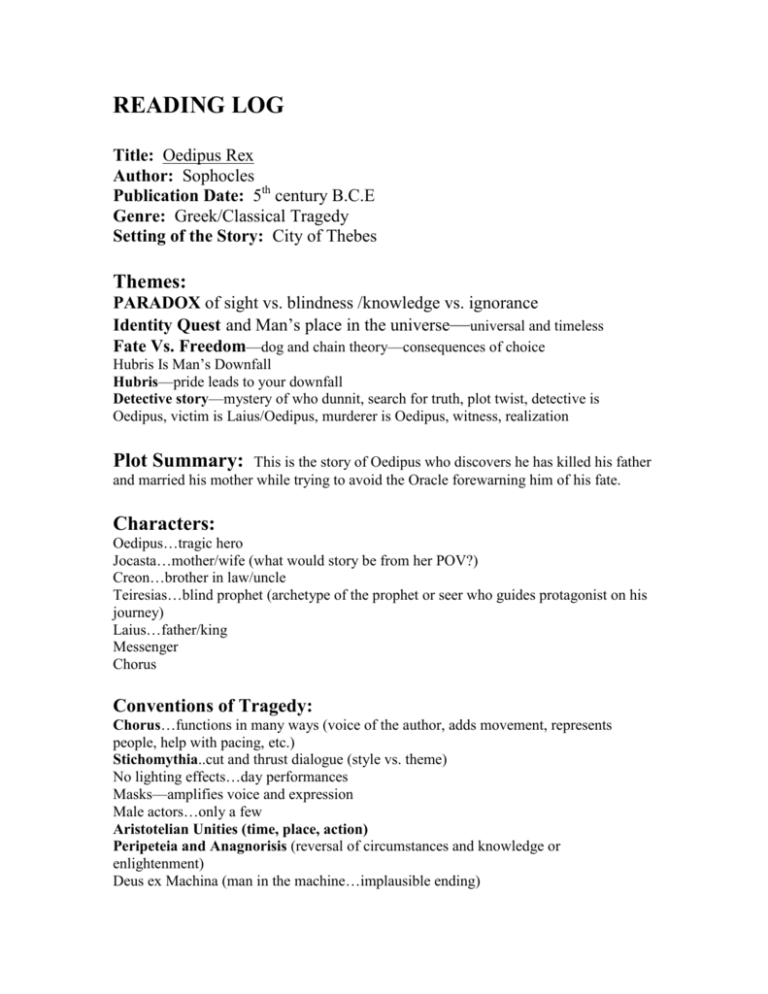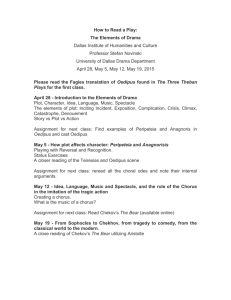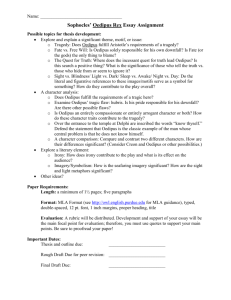READING LOG
advertisement

READING LOG Title: Oedipus Rex Author: Sophocles Publication Date: 5th century B.C.E Genre: Greek/Classical Tragedy Setting of the Story: City of Thebes Themes: PARADOX of sight vs. blindness /knowledge vs. ignorance Identity Quest and Man’s place in the universe—universal and timeless Fate Vs. Freedom—dog and chain theory—consequences of choice Hubris Is Man’s Downfall Hubris—pride leads to your downfall Detective story—mystery of who dunnit, search for truth, plot twist, detective is Oedipus, victim is Laius/Oedipus, murderer is Oedipus, witness, realization Plot Summary: This is the story of Oedipus who discovers he has killed his father and married his mother while trying to avoid the Oracle forewarning him of his fate. Characters: Oedipus…tragic hero Jocasta…mother/wife (what would story be from her POV?) Creon…brother in law/uncle Teiresias…blind prophet (archetype of the prophet or seer who guides protagonist on his journey) Laius…father/king Messenger Chorus Conventions of Tragedy: Chorus…functions in many ways (voice of the author, adds movement, represents people, help with pacing, etc.) Stichomythia..cut and thrust dialogue (style vs. theme) No lighting effects…day performances Masks—amplifies voice and expression Male actors…only a few Aristotelian Unities (time, place, action) Peripeteia and Anagnorisis (reversal of circumstances and knowledge or enlightenment) Deus ex Machina (man in the machine…implausible ending) Catharsis (purging of emotions PITY and FEAR) Hamartia (false step leading to downfall) Plot is the most important element Distinguishing Characteristics of the Work: (1) Peripeteia and Anagnorisis occur at the same time (change in circumstance and enlightenment happen at the moment Oedipus discovers who he really is) (2) Unities are adhered (one day, one place, all action focused on finding killer) (3) Aristotle claims it is the perfect tragedy (4) Tragic hero has flaw of hubris which leads to his downfall. He is noble and essentially good. (5) Catharsis occurs…audience pities Oedipus because it is not entirely his fault, but we are relieved it is not us. We fear that if one as high-standing as Oedipus could fall, then it could happen to us. (6) Broader significance? The search for truth and one’s true self is the ultimate goal of any individual…Oedipus’s willingness to defy fate/destiny is admirable Tone: Serious work arousing pity and fear in audience. Structure: Prologue…background/opening Parados…chorus enters Episode…plot develops and thickens Stasimon/Ode…end/chorus views given Exodus…Final action Your response to the style and content of the work: Glad it happens to Oedipus and not me Believe that if it can happen to someone as noble and high standing as Oedipus, then it could happen to anyone Pity and fear is aroused Hubris or excessive arrogance/pride can be man’s downfall Man is fated to a particular end, but he has freedom to make choices along the way and must ultimately be responsible for the consequences of his choices.









